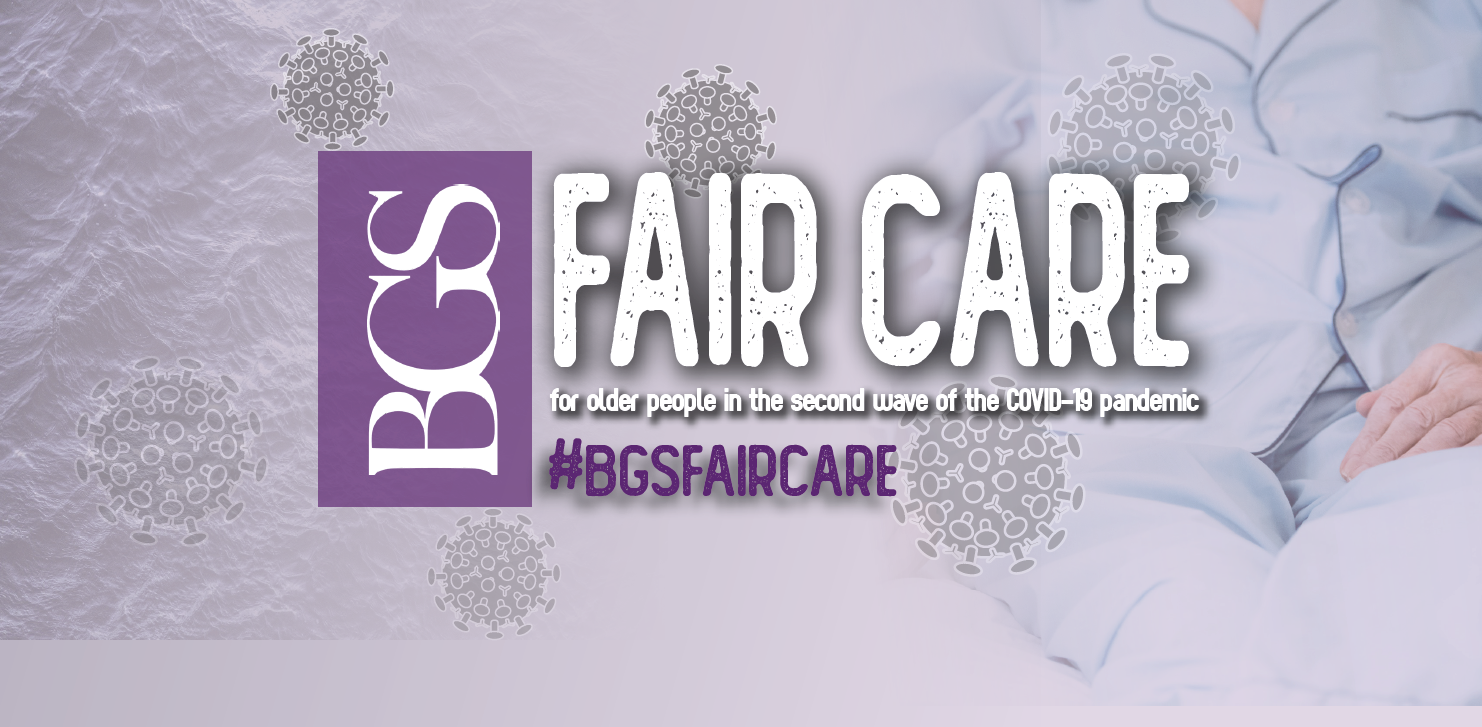The BGS has launched a campaign across the four nations of the UK to raise awareness of issues critical to protecting older people during the second wave of the COVID-19 pandemic. In addition to an open letter sent to Secretary of State for Health and Social Care Matt Hancock, the Society is asking healthcare professionals to write to their elected official to alert them to key lessons from the first wave that must now be applied to avoid a repeat of the terrible toll experienced by older people earlier in the pandemic.
The COVID-19 pandemic has had a huge impact on older people: 90% of COVID-19 deaths in the first wave of the pandemic were in people aged over 65. There were 26,000 excess deaths in care homes in England and Wales between March and June this year and across the UK around 40% of COVID deaths occurred in care home residents.
A second wave of the pandemic has now taken hold, with numbers of positive cases rising daily and a new national lockdown recently announced in England. The urgent priority must be to apply learning from the first wave to ensure that older people are not disproportionately affected by the second wave of the pandemic and its associated restrictions.
The BGS is urging the Government, the NHS and care organisations in all parts of the country to consider the following critical issues:
- Policy decisions and allocation of resources must be made on the basis of evidence and need, not age. Older people are not a homogenous group – some people aged over 65 will be incredibly active and mobile and others will be living with long-term conditions, including frailty. It is also important to remember that while the majority of deaths from COVID-19 have been in the older age group, most older people who contract the virus will recover. Older people have as much right to appropriate treatment as any other member of society, and we urge the Government to guard against ageism in its allocation of resources.
- Address pent-up demand for NHS and social care services. During the pandemic many elective procedures, outpatient consultations and social supports were cancelled, having a devastating impact on those who benefit from them. The NHS is now working hard to restart these services. While we appreciate that services such as cancer diagnosis and treatment will, and should, be prioritised, we urge the prompt restarting of no less vital services such as falls prevention and community rehabilitation and support services. These services help older people and their carers to stay healthy at home, reducing demand on emergency services and releasing hospital and care home capacity. It is essential that these services are kept going throughout the second wave and the second lockdown, and the NHS must be supported to keep non-COVID services going alongside treating COVID patients.
- Care homes must be supported. Care homes were left unprotected, particularly at the beginning of the pandemic, with devastating results. Care homes must have equitable access to PPE and to regular testing, and prompt results, for residents and staff. Homes must also be supported to set up effective isolation facilities for residents with symptoms or confirmed COVID-19. Given the detrimental effect on quality of life for care home residents through not being able to see their loved ones, care homes must be supported to enable safe visiting. As we enter a new lockdown across England, it is essential that the blanket ban on care home visiting is not repeated. This Government has committed several times to a sustainable solution to the crisis in social care and the pandemic has highlighted that urgent and meaningful action in this area is now critical.
- Acknowledge the harm to physical and mental health caused by lockdown. The BGS believes that for many older people, lockdown poses almost as much of a threat as COVID-19. Older people have spent months inside, not participating in their usual activities and being far less active than they normally are. They now face at least another month of this as restrictions are tightened again. This is particularly challenging for older people who have cognitive impairments and may find it difficult to understand why they are restricted or why they need to take precautions. Many older people are likely to have experienced physical deconditioning as a result, leaving them more susceptible to other illnesses, falls and hospitalisation. Investment in exercise and rehabilitation services is crucial to ensuring that the long-term impact of COVID on older people is minimised.
- Recognise the work of NHS and social care staff. The first wave of the pandemic saw an outpouring of public appreciation for those who work in health and social care. It is important that this public appreciation is followed by concrete recognition for staff including addressing the low numbers of trainees in geriatric medicine, increasing district nursing and advanced practitioner capacity, and taking steps to ensure that working in social care and care homes is seen as an attractive career choice and is remunerated on a scale commensurate with those working in the NHS.
The BGS urges all healthcare professionals caring for older people in the UK to write to their elected official as a matter of urgency to ensure older people’s needs are not marginalised as they were during the first wave of the pandemic. Ensuring that older people have the care and support that they need, when and where they need it, will help to minimise COVID-19 related harms for this population group and will strengthen the resilience of the whole health and care system.
|
Here is how you can support the #BGSFairCare campaign:
|






